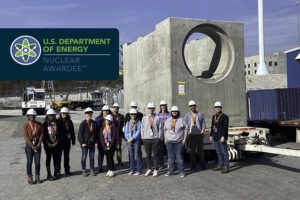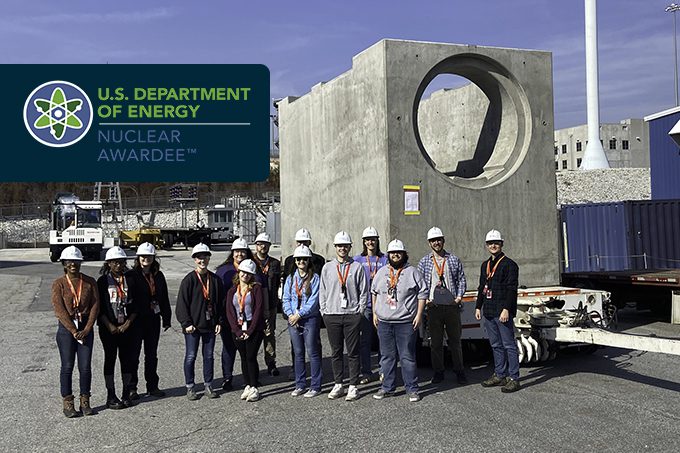A consortium led by Clemson University is offering funding opportunities to a wide range of South Carolina, North Carolina and Georgia organizations as part of an effort to engage community conversations about nuclear energy and waste.

Groups eligible for funding from the South Carolina consortium include but are not limited to: community service organizations; city and county government organizations; faith-based groups; technical training organizations; all educational and training institutions; trade and other related worker organizations; and all business and community development organizations.
The funding opportunities include community action and engagement funds up to $10,000, planning grants up to $20,000, and implementation awards up to $100,000. They are made possible by a $2-million grant from the U.S. Department of Energy to the Nuclear Waste Dialogue (NuWaDi) Consortium led by Clemson University and the South Carolina Universities Research and Education Foundation (SCUREF).
Clemson faculty members leading the consortium are Lindsay Shuller-Nickles and Nicole Martinez, both associate professors of environmental engineering and Earth sciences, and Lori Dickes, associate professor in the Department of Political Science and the director of Clemson’s Office of Faculty ADVANCEment.
“The central goal of the grant is to expand and strengthen the voices in our region in discussing anything related to nuclear energy or waste,” Shuller-Nickles said. “We look forward to engaging in fruitful dialogue with stakeholders across the state.”
The Energy Department has established 12 consent-based siting consortia throughout the country, including the one in South Carolina.
The consortia “support the U.S. Department of Energy’s efforts to facilitate inclusive community engagement and elicit public feedback on consent-based siting, management of spent nuclear fuel, and federal consolidated interim storage,” according to the department’s website. “The 12 awardees are comprised of various organizations to help reach communities across the country and remove barriers to participate in the department’s consent-based siting process.”
Clemson researchers emphasized that at this point in the consent-based siting process, South Carolina’s participation in the program is not necessarily a prelude to new disposal facilities being built in the state.
“South Carolina community groups will have the opportunity to draw on their collective experience to offer essential insight into a national challenge and a clear need,” Martinez said.
Clemson brings to the table faculty with a long history of studying nuclear energy and the nuclear fuel cycle from an environmental perspective. The University’s faculty also has a broad range of expertise that aligns with the Energy Department goals, researchers said.
“I am passionate about interdisciplinary problem solving as it relates to complicated issues like nuclear power or nuclear waste siting, along with other related natural resource issues,” Dickes said. “It’s important that we have an opportunity to show community members that diverse disciplines and a wide spectrum of individuals across the region are converging to study and understand these issues is the way we all have to come together to solve them.”
The funding opportunities are one part of the Energy Department grant. The consortium also plans to survey grant awardees and then create interactive maps aimed at informing collaborative decision making. Another part of the grant calls for the consortium to develop a virtual hub for its activities and resources, a nuclear waste primer for non-experts and STEAM modules on nuclear art and culture.
The consortium is also planning grant writing workshops, community conversations, and K-12 educator workshops.
The grants include:
* Community action and engagement funds could cover a wide range of activities from a lecture series and youth scouting badges to field trips and exhibits at farmers’ markets. Activities should be innovative, inclusive, able to attract a significant audience and address interested parties that have a role in consent-based siting.
* Planning grants will cover expenses for three months and are designed to empower regional groups in mobilizing their community’s resources to address aspects of consensus building related to complex and controversial issues. Planning grant awardees are encouraged to apply for an Implementation award.
* Implementation awards will fund larger and more comprehensive projects and may originate from planning grants. The consortium will be looking for applicants with demonstrated community reach and a history or planned development of consensus building. The applicants will need to exhibit knowledge of challenges associated with consent-based siting and propose solutions to overcome those challenges.
For more information about the grants, join our virtual open house on Thursday March 7, 2024 from 12-1 p.m. or 6-7 p.m. Visit the NuWaDi Virtual Hub at https://nuwadi-clemson.hub.arcgis.com, or contact Shuller-Nickles at lshulle@clemson.edu.
Get in touch and we will connect you with the author or another expert.
Or email us at news@clemson.edu

